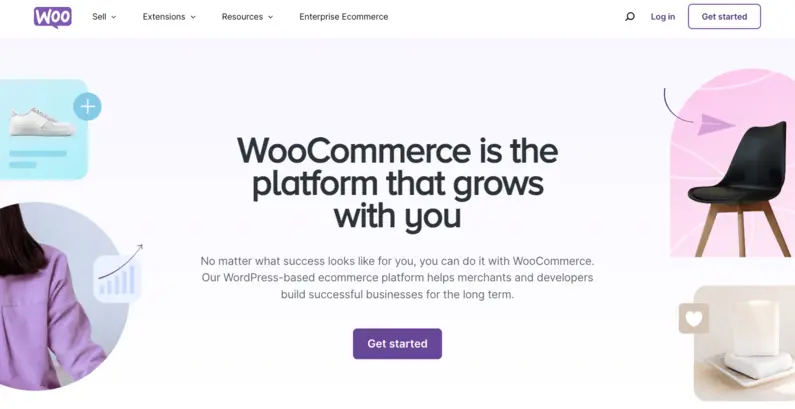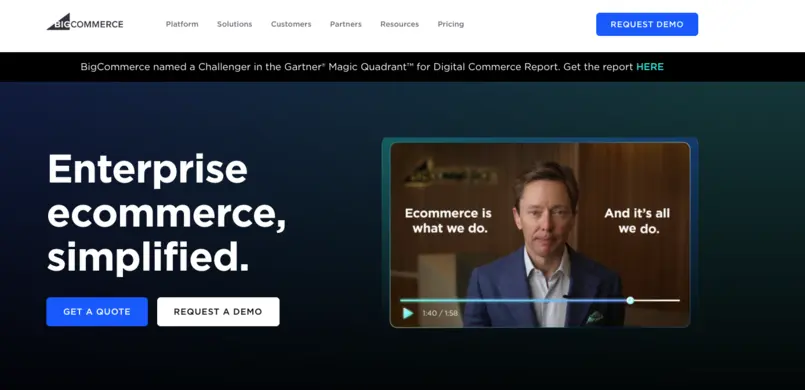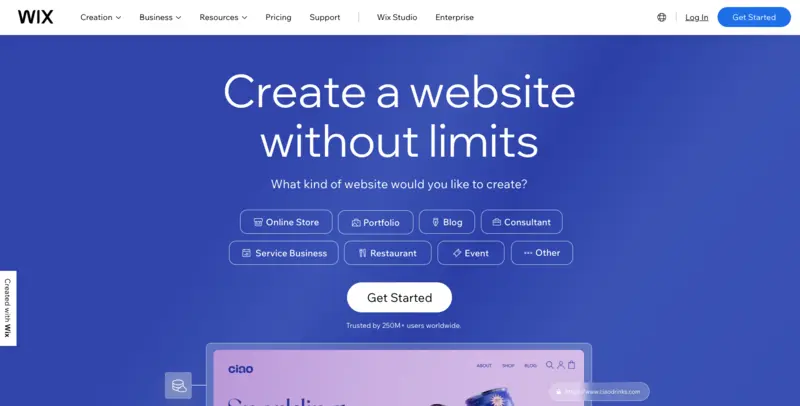- David Mason
The 6 Best eCommerce Website Builder Platforms
Owning an ecommerce store is no longer an option for businesses, but a necessity.
With the rapid shift to online shopping, having a website to sell your products is critical for reaching new customers and growing your business.
But building an effective online store can seem like a daunting challenge.
How many of us have the technical skills or budget to design a site from scratch? This is why ecommerce website creation platforms have revolutionized the industry.
These intuitive website builders allow you to create a professional online store quickly and with minimal investment.
With pre-designed templates, built-in ecommerce features, and easy-to-use drag-and-drop tools, you can have your site up and running in days or weeks, not months.
But with so many options to choose from, how do you find the best ecommerce website creation platform for your business?
Each has different strengths and weaknesses in terms of functionality, design, cost, and more.
“Web development is difficult, only then it is fun to do. You just have to set your standards. If it were to be easy, would anyone do it?” –Olawale Daniel
In this guide, we compare the key features, pros, cons, and pricing of the top 6 ecommerce website builders to help you determine the best choice for launching your online store
After reading, you’ll have the knowledge to choose the right ecommerce website creation platform to turn your vision into reality.
So, let’s get started!
With so many options to choose from, how do you find the best ecommerce website creation platform for your business?
Each has different strengths and weaknesses in terms of functionality, design, cost, and more.
What are we talking about in this article?
ToggleShopify

Shopify is by far the most popular all-in-one solution for creating a feature-rich ecommerce website. Trusted by over 1 million businesses, Shopify makes it easy to set up a professional online store and start selling quickly.
Key Features
- Intuitive drag-and-drop store builder with 100+ templates
- Built-in payment processing, shipping calculator, and order tracking
- Unlimited product listings and inventory management
- SEO optimization with fast page speeds
- 24/7 live chat and phone support
Pricing Plans
Shopify pricing starts from $29/month for basic stores and scales up based on features and transaction volume needed.
You can try it totally free for 3 days and then $1/month for 3 months.
I’ve personally used it extensively, and I can confidently say that it’s the best all-in-one solution if you’re just starting and want everything you need to kickstart an ecommerce business.
- Everything needed to build an online store in one platform
- Easy to use even for beginners
- Big app marketplace with extensions for advanced functionality
- Scales to enterprise-level ecommerce
- Constant platform improvements and updates
- Transaction fees on top of the monthly subscription cost
- Limited customization compared to standalone platforms
- It can get expensive for large inventory or order volumes
WooCommerce

WooCommerce is a free open-source WordPress plugin that allows you to turn an existing WordPress site into a fully-functional online store. With unlimited personalization and add-ons, it’s the most customizable ecommerce option.
Key Features
- Free plugin transforms WordPress into an ecommerce site
- Low cost for advanced use
- Complete store setup including products, payments, shipping, taxes
- Extremely customizable via themes, page builders, and extensions
- Centralized control of orders, inventory, and reporting
- Access to WordPress resources and community support
Pricing Plans
WooCommerce is free but requires WordPress hosting for different prices.
If you don’t know which one to choose I suggest you take a look at this article.
Paid extensions are available for advanced functionality. It offers maximum flexibility and customization.
If you’re looking for a wide range of customization, functionality, and integrations, WooCommerce is the perfect solution for you.
I don’t rank it first simply because it requires a bit more experience to use effectively.
However, if you’re already familiar with the territory and seeking something powerful, WooCommerce is at the top of the list.
- Free, open-source platform with full control
- Advanced personalization with site design and functionality
- Wide range of payment gateways and shipping carriers
- Scales to very large online stores
- Large selection of free and paid extensions
- Requires WordPress web hosting (added cost)
- The steeper learning curve for beginners
- Need developer skills for extensive customization
- Not all-in-one solution
BigCommerce

BigCommerce is a robust, enterprise-grade SaaS solution tailored for fast-growing online stores. It provides powerful built-in features with the flexibility to scale to large operations.
Key Features
- Intuitive store builder with 100+ professional theme options
- Built-in search engine optimization
- Multi-channel sales integration on Amazon, Facebook, Instagram and more
- Advanced order, inventory, and fulfillment management
- Powerful analytics with sales reports and insights
Pricing Plans
BigCommerce pricing starts from $39/month. It’s best for established ecommerce brands looking to scale.
You can request a demo to test the platform or take advantage of the 15-day trial.
- Reliable hosting with excellent uptime and security
- Scales to large catalogs and order volumes
- B2B features like customer groups with pricing
- Integrates with major shipping carriers, POS systems, accounting tools
- Experienced technical support and expertise
- Higher starting price point than other platforms
- Limited free themes compared to Shopify and others
- Potential fees for payment processing depend on the plan
Squarespace

Squarespace is a popular all-in-one web-building platform with beautiful designer-made templates. While it lacks some advanced ecommerce features, it enables anyone to create a gorgeous online store.
Key Features
- Stylish templates optimized to showcase products
- Easy to use drag-and-drop store builder
- Built-in payment processing, shipping, and taxes
- Excellent built-in blogging and galleries to feature products
- Powerful website analytics and traffic tools
Pricing Plans
Squarespace pricing starts at $23/month. It’s best suited for image-driven online stores focused on design.
A full 14-day free trial is available to see if this platform is right for your needs
- Allows anyone to build a professional-looking store quickly
- Award-winning modern and minimalist templates
- Easy integration with email marketing, social media, and other marketing tools
- Top-notch website analytics and performance
- Lack of advanced ecommerce functionality compared to dedicated platforms
- Limited control over customization due to template structure
- Transaction fees on top of subscription costs
Magento (Now Adobe Commerce)

Magento is a self-hosted open-source ecommerce platform built for developers and high-volume merchants. Known for its unparalleled flexibility and scalability, it powers over 250,000 sites.
Key Features
- 100% free open-source download
- Complete control over code, design, features
- Optimized for SEO, performance, and security
- Runs enterprise sites with billions in revenue
- Extensive built-in marketing and analytics tools
Pricing Plans
Magento offers a free and open-source version (Magento Open Source) as well as a paid version (Magento Commerce, previously known as Magento Enterprise Edition).
The Magento Open Source edition is free to download and use, but you’ll need to cover hosting costs and any additional extensions or customization you might require.
The Magento Commerce edition, on the other hand, is a paid solution that includes additional features, support, and services.
- Free and open-source
- Limitless customization for developers
- Powers many of the largest online retailers
- Extremely scalable and reliable
- Huge selection of extensions
- Very complex for beginners to implement
- Requires developers and IT expertise
- The self-hosted platform requires its own servers
- Costly for small businesses
Wix

Wix offers a highly user-friendly drag-and-drop website builder with extensive ecommerce features targeted at boutique and handmade store owners.
Key Features
- ADI (Artificial Design Intelligence) for customized store design
- Tailored ecommerce solutions for art stores, boutiques, jewelry, crafts
- Built-in payment processing, shipping labels, and order tracking
- Detailed insights into sales, customers, and marketing analytics
Pricing Plans
Wix offers a free plan, but it comes with limitations and Wix branding on your site.
If you want to remove these limitations and have access to more features, you’ll need to upgrade to one of their premium plans, which come with a monthly subscription fee.
- Pre-designed templates for boutique, handmade, and specialty stores
- Easy-to-use store builder and manager
- Quality graphics, video, and blogging built-in
- Top-rated customer support and documentation
- Some advanced B2B ecommerce features lacking
- Transaction fees on top of subscription costs
- Primarily suited for small-to-medium-sized online stores
Evaluating Your Ecommerce Website Needs
With this overview of the top ecommerce website builder options, how do you determine the best platform for your online store? Here are some key factors to evaluate
- Your budget – Some offer free plans while others start at $23-$39/month
- Technical expertise – Platforms like WooCommerce and Magento require development skills
- Design priorities – Some builders offer better creative customization than others
- Product catalog size – Ensure the platform scales with your inventory needs
- Built-in features – Assess specific ecommerce, CRM, and marketing tools required
- Support and documentation – Compare the availability of user manuals, communities, and help centers
Taking the time to thoroughly assess your business needs and resources will ensure you pick the best DIY ecommerce website builder to create your ideal online store.
Turning Your Ecommerce Vision into Reality
An online store allows any business to expand its reach and start selling products globally. With the rise of ecommerce, the barriers to building a professional, feature-rich website have disappeared.
Using an intuitive drag-and-drop website building platform, anyone can now set up a great-looking online store within days or weeks, not months.
Packed with built-in ecommerce functionality and design customization, these solutions make it simple for businesses of any size and technical skill to turn their vision into a website that converts.
With the right platform tailored to your business requirements, you can quickly turn your ecommerce vision into reality.
The website builders covered here have the proven features and flexibility needed to create successful online stores across every industry and niche.
Final Tips
Here are some final tips when selecting and implementing your ecommerce website platform:
- Take advantage of free trials to test out platforms before committing
- Start with a simple design before customizing – don’t overcomplicate early on
- Leverage built-in features as much as possible to save time and costs
- Focus on quality product images, descriptions, and storytelling
- Make sure your platform is mobile-optimized for smartphone shoppers
- Implement essential security like SSL encryption from the start
- Integrate email marketing and social media to boost conversions
- Analyze site analytics frequently to identify opportunities to optimize
Building a profitable ecommerce website does take consistent time and effort.
But choosing the right DIY platform lays the foundation for success by providing you with all the tools and capabilities required for converting visitors into loyal customers.
The ecommerce builders covered here allow entrepreneurs and small businesses to competitively sell online and realize your vision without needing large budgets or technical expertise.
So don’t wait any longer to showcase your products to customers globally, select the best ecommerce website platform for your business goals and start selling online today!
*Attributions*
Image cover Freepik




